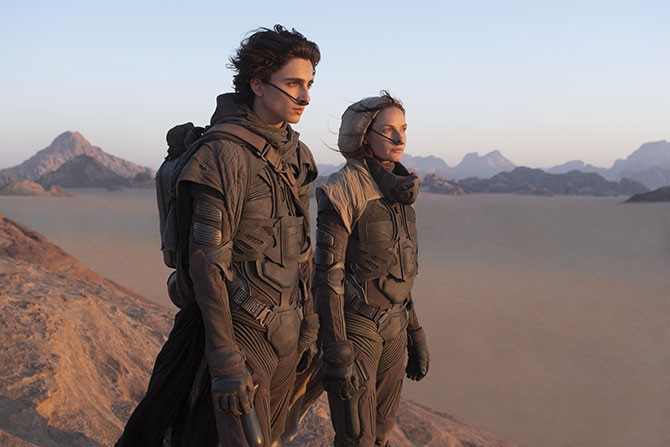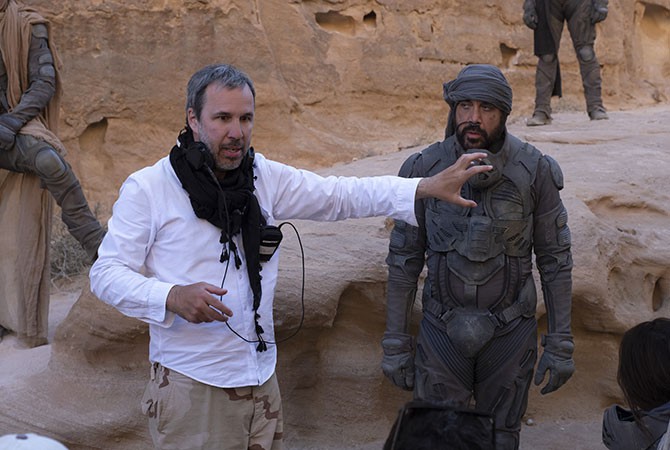In the year 10191, Paul Atréides, played by Timothée Chalamet in Denis Villeneuve’s film, lands on a desert planet called Arrakis. With his mother, Jessica, a member of the influential Bene Gesserit religious order, the young man will bond with an indigenous people with customs inspired by Islam – the Fremen – and face his destiny as Messiah. Here is the synopsis of Dunesthe first part of a saga of six novels written by the American Frank Herbert between 1965 and 1985. One of the best-selling science fiction novels in the world.
In this work which strikes by its capacity to install a coherent and complex universe, the religion is omnipresent. A great connoisseur of Dune and professor of chemistry at the Sorbonne, Fabrice Chemla guides us through the intricacies of the religious systems created by Frank Herbert. He has published several articles in a collection entitled Dunes, escientific and cultural exploration of a planet-universe (Le Bélial, 2020), including one on religion in the novel.
You say in your article entitled “God, the Emperor and the rest” that the religious is the mainspring of the work. Why ?
The cycle of Dunes is essentially focused on the relationship between religion and political power. This is its main subject, even before the ecological dimension which resonates more strongly today than when it was first published.
In his first five books, he stages the establishment of a theocracy through a messiah, Paul Atreides (later named Muad’Dib), who will take power reluctantly. The messianism of Dunes is above all inspired by Shiite Islam and its “Mahdi”, a term taken up verbatim by Herbert. This is the last “occulted” imam who must return to lead the community of believers.
In Dunes (ed. Robert Laffont, 2021), Christianity merged with other religions. What is the “Orange Catholic Bible” the novel refers to?
Herbert positions his novel in the very distant future. It materializes this passage of time by transforming the religions we know, by syncretizing them. At the time of Dunes, humanity has learned to travel in space. The shock of this advance caused many convulsions in the religious world. A first “jihad” described as “Butlerian” – in reference to Samuel Butler, a British author from the second half of the 19th centurye century – destroyed all advanced machines. After this jihad, ecumenical work is undertaken to calm people down.
Gathered in conclave, all the religions of the time resulted in a book, the “Orange Catholic Bible”, fundamental from the religious point of view in the universe of Dunes. The word “orange” refers to the Orange Order, a very active Protestant fraternal organization in Northern Ireland. The main teaching of this book is: “Thou shalt not deform man”, a way of taking up the anathema cast by the “Butlerian jihad” on the construction of machines in the image of man.
What is his interpretation of messianism and more broadly of religion?
Herbert writes Dunes to demonstrate that you have to be wary of “superheroes” or supermen. However, the figure of the prophet introduced by monotheistic religions is, according to him, the archetype of this superhero. He tried to show how social systems, especially the religious system, could be dangerous because they take over humans. Because for him, religion is based, like many other systems, on a paradox: it allows control over humans while also promising their liberation. This paradox is a linchpin of the whole cycle.
Does Frank Herbert manage to account for this paradox or does he make a formal criticism of religion?
He is not in the cartoon. This is what makes all the richness of his approach to religions. To simplify, the first three books bring into play a population – the Fremen – whose beliefs are a mixture of Islam with touches of Zen Buddhism and a strong millennial component.
On the other hand, one of the main actors in the saga is a religious order directly inspired by the Jesuits: the Bene Gesserit. The latter seeks to bring about, by genetic crossing, a providential man named “The Kwisatz Haderach”, another figure of the superman. However, the person who should have been the father of this future Kwisatz Haderach is beyond their control.
It’s Paul, the hero of Dunes. He finds himself on a desert planet in contact with the underprivileged population of the Fremen and he becomes their messiah. He will take the lead in their revolt and overthrow the Empire to instead establish a theocracy of which he will be a kind of “king-god”.
Thus, from the religious point of view, the cycle of Dunes oscillates between the messianism of the Fremen and the quasi-agnostic materialism of the Bene Gesserit which considers religion as a tool to establish its power and achieve its objectives.
Isn’t this a way of reviving old clichés about the Jesuits?
Frank Herbert was undoubtedly inspired by it. “Religion inevitably leads to rhetorical despotism. Before the Bene Gesserit, the Jesuits were past masters in the matter,” he writes in The God-Emperor of Dune. But I don’t think he stopped at this received idea.
Fanaticism on the one hand, cynicism on the other… Isn’t Herbert’s a priori on religion above all negative?
It’s more subtle than that. What Herbert wants to denounce is the union of religion and politics, a union which, according to him, leads to absolute oppression. He condemns theocracy, that is to say when politics is constituted in religion and imposes the maintenance of a Tradition erected in dogma which no longer accepts evolution.
As a Bene Gesserit proverb says, “When religion and politics travel in the same wagon, travelers think nothing can stop them. They go faster and faster. They then forget that a precipice always reveals itself too late. »
Is this place given to the religious an originality of Dunes or a common feature of science fiction books?
The religious theme is not foreign to science fiction (SF), even if it does not constitute the majority of the corpus. Some authors like Serge Lehman even maintain that the main object of SF is the encounter with God. This analysis proposed in 2009 in the preface to back to the horizon, (ed. Denoel), seems interesting to me. From my point of view, I think that SF is interested in religion because it challenges the idea of transcendence.
From the Christian point of view, we can cite The Sparrow of God, by Mary Doria Russel, published in 1996, which recounts a Jesuit’s encounter with extraterrestrials. In the 1960s and 1970s, Philip José Farmer wrote extensively on the subject, wondering if monotheism could be reconciled with the fundamental otherness that extraterrestrial life constitutes. It is necessary to read in particular his short story entitled “The father”, from his collection strange reports. We can also cite Arthur Clarke, who wrote, in 1958, a masterful short story on this theme, entitled The star (ed. Le Belial, 2021).
Is the importance given to religion in Dune outdated today, at a time when religions are losing ground in the Western world?
I do not believe that religion is disappearing. He transforms. If established religions are weakening, of course, religious feeling is still powerful today. That’s why it’s good to (re) read Dunes in our time !

Religion: is Denis Villeneuve’s film up to it?
The subject was undermined. As soon as the trailer was released in September 2020, critics rained on Denis Villeneuve’s adaptation. He is criticized for having erased the term “jihad”, very present in the book. The film does not evoke it, confirms the journalist specializing in pop culture Lloyd Chéry who saw it in preview. “Denis Villeneuve erased it voluntarily to avoid useless polemics, he explains. It is impossible to use this term in an American blockbuster today. But all the other Arabic names are there. »
A deletion that is not shocking, believes Lloyd Chéry, because this term is not essential to the development of the scenario. On the other hand, faithful to the book, the film evokes the “crusade” to evoke the fight of the hero, Paul. It is not a substitution of the word “jihad” because the two words do not designate the same reality.
For the rest, the treatment of religion in the film is less frontal than in the book but it is present, unlike the first adaptation of the book by David Lynch in the 1980s which had concealed this aspect. “The messianic dimension of Paul begins to appear, reveals Lloyd Chery, but it should be more developed in the next films. » One or two other films are actually planned to continue the adaptation of Frank Herbert’s “cycle”.
Roland Lehoucq (dir.), Dunes. Scientific and cultural exploration of a planet-universeLe Belial, 2020
Nicholas Allard, Dune, a masterpiece of science fictionDunod, 2020
Lloyd Chery (ed.), Dune, the mookThe Atalanta, 2020

